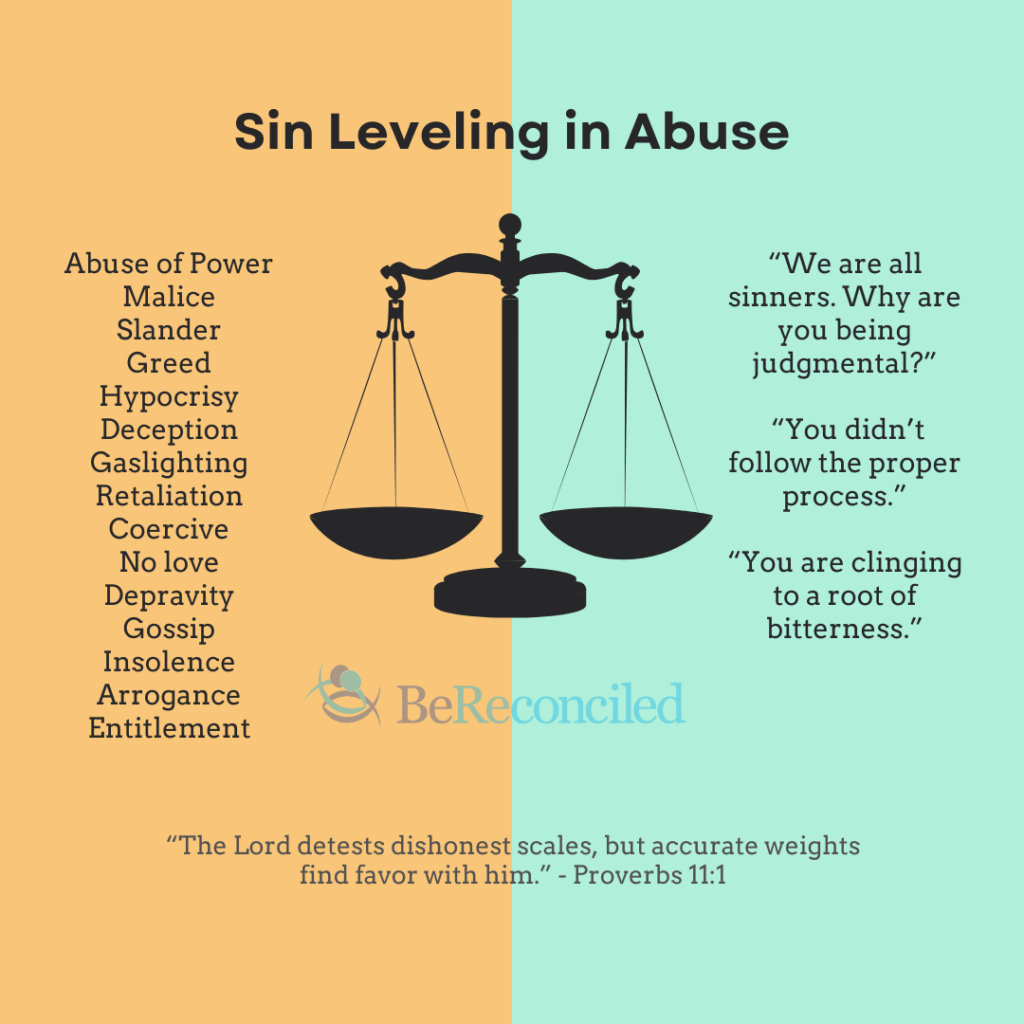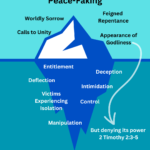In Nate Brook’s article, “What About the Abused Spouse’s Sin?,” he warns us not to fall into the trap of “mutualization” or “equalization” of sin in abuse cases. Sin-leveling can cause great harm and further injustice by not taking into account the greater weight of responsibility for more heinous sins. The error of sin-leveling is easy to do, especially when victims of abuse can appear to be bitter and over-reactive as they react to the gaslighting happening right in front of them while an abuser appears to be calm and collected. Brooks states:
“A counselor can easily and incorrectly become convinced that because both parties sin in the relationship, both parties are equally responsible for the relational problems. Such a counselor might say, “He is manipulative; you respond with anger, so each of you needs to get the log out of your own eye before dealing with the speck in your own eye.”
Nate Brooks posits the categories of catalytic and derivative sin which helps us to remember that some sins are more damaging and weighty than others. While all sin leaves us in need of a savior, not all sins are equal in impact and damage to others. Brooks calls “catalytic” sins those sins where a perpetrator has been the catalyst for another’s sin. The response to this catalytic sin can be labelled “derivative” sin– sin that comes into existence in response to someone’s sin. Perhaps this is why Jesus calls Judas’s sin greater than Pilate’s sin (John 19:11). In criminal law, there are often harsher consequences for premeditated crimes versus heat of the passion crimes.
When a sinner is sinned against, he may sin back. A child that has been bullied at the playground may snap and respond wrongly to his bully. In abuse cases, it is helpful to give greater weight and responsibility to the perpetrator of abuse when calling parties to repentance. Repentance on the part of a perpetrator means that he recognizes and owns the great harm he has done and embraces justice and restitution for those he has harmed. Sin-leveling by an oppressor is blame shifting and is the opposite of repentance. It is a way for him to say, my sin and debt to the oppressed is not that great.
An Example of Sin-Leveling: Call the Victim Bitter and Unforgiving
Let’s look at an example of sin-leveling in abuse. An oppressor may label his victim as unforgiving, angry, or bitter when the victim calls him to repentance. Never mind the fact that the victim, a 15 year old girl, was violated by her youth pastor who used his privileged position to take advantage of her. The story we are told is that she should forgive her abuser and not harbor bitterness in her heart. After all, it was a consensual encounter and she caused a man of God to stumble, so the narrative goes. Abusers and their supporters willingly sacrifice people made in the image of God at the altar of their idols.
We previously noted that a key characteristic of abuse is the misplaced assignment of responsibility. We noted that in deflection, abusers divert negative attention away from themselves and direct positive attention to themselves. The oppressed end up carrying the guilt and shame that actually belong to the perpetrator of abuse while the abuser looks like the penitent one. Those loyal to an abuser may accept an abuser’s ‘concessions’ as true repentance and believe that a victim is being unforgiving. The burden is then put on the violated party to forgive their unrepentant oppressor and get rid of bitterness in their hearts. This compounds the harm of the original abuse and minimizes the sin of the oppressor.

Untwisting the Root of Bitterness Passage: Hebrews 12:15
One passage of Scripture that abusers and their followers misuse and weaponize is “the root of bitterness” passage in Hebrews 12:15. Is the root of bitterness described there unforgiveness? Or is the root of bitterness something else? The book of Hebrews was written to the church, in particular to a group of Hebrew Christians, not to an individual. Let’s examine this passage more closely.
The passage goes like this:
15 See to it that no one fails to obtain the grace of God; that no “root of bitterness” springs up and causes trouble, and by it many become defiled; 16 that no one is sexually immoral or unholy like Esau, who sold his birthright for a single meal. 17 For you know that afterward, when he desired to inherit the blessing, he was rejected, for he found no chance to repent, though he sought it with tears. – Hebrews 12:15-17, ESV
The author of Hebrews references Deuteronomy 29:18-19, which states:
18 Beware lest there be among you a man or woman or clan or tribe whose heart is turning away today from the Lord our God to go and serve the gods of those nations. Beware lest there be among you a root bearing poisonous and bitter fruit, 19 one who, when he hears the words of this sworn covenant, blesses himself in his heart, saying, ‘I shall be safe, though I walk in the stubbornness of my heart.’ This will lead to the sweeping away of moist and dry alike.
In Untwisting Scriptures, Rebecca Davis explains that in these two passages, the root of bitterness or the root bearing “poisonous and bitter” fruit is not the feeling of bitterness but is a person in the midst of the congregation who produces something poisonously “bitter.” The poison stems from a person who: “turns away from the Lord God to other gods, blesses [exalts] himself in his heart (essentially treating himself like a god), and thinks he will be safe, even though he walks in the twisted obstinance of his heart.”1
This obstinate and proud person will lead to people being swept away and harmed and invites the judgment of God. Poison and wormwood in Scripture often refer to the unfaithful and to the judgment of God. (Deut 29:18-19, Amos 6:12, Jeremiah 8:14, 9:15, 23:15, Acts 8:23.)
Got Questions Ministry explains:
“In the Hebrew culture, any poisonous plant was called a “bitter” plant. Poison destroys, and the result of ingesting a poisonous plant would be bitter, indeed. The author of the book of Hebrews uses a “bitter root” as a metaphor for that which would bring harm to the church.
…
So, the “bitter root” in Hebrews refers to a source of evil or wickedness within the church. A root may be small and slow in its growth, but, if it carries poison, it is malignant; it is dangerous. Sin in the church must be diligently rooted out; the result of tolerating wickedness is that “many” will be defiled.”
Seeking True Justice and Accountability
If we are to “put off” sin-leveling in abuse, we are to “put on” seeking true justice and accountability. In Amos 6:12-13, we see Amos calling out the Israelites. Similar to what we see in Deuteronomy 29:18-19, Amos warns those who exalt themselves while perverting justice and righteousness. Notice his references to poison and bitterness.
12 But you have turned justice into poison
and the fruit of righteousness into bitterness—
13 you who rejoice in the conquest of Lo Debar
and say, “Did we not take Karnaim by our own strength?” (NIV)
Dealing with the root of bitterness means calling the church to deal with wickedness within the church, lest it be defiled and invite the judgment of God. This means taking righteousness, justice, and repentance seriously. True repentance leads to life. False repentance leads to death.
Prayer: Lord, in you is life and light. Be our refuge. May your people be in the business of doing justice and loving mercy. May we take sin seriously. May we love the oppressed and the least of these well, even while calling sinners to repentance. In Jesus’s name, Amen.
Related Links:
- Christian Conciliator Daniel Teater’s article: “Power Imbalances and Abuse Dynamics in Christian Conciliation.”
- Whistleblower and Journalist Rebecca Hopkins’s article: To Reconcile or Not to Reconcile.
- Kevin Youngblood’s article: Don’t Get Even, Get Mad! Imprecatory Prayer as a Neglected Spiritual Discipline: (Psalm 69).
Footnotes:
- Davis, Rebecca. Untwisting Scriptures: that were used to tie you up, gag you, and tangle your mind (2016th ed.), pp.77-78. ↩︎






